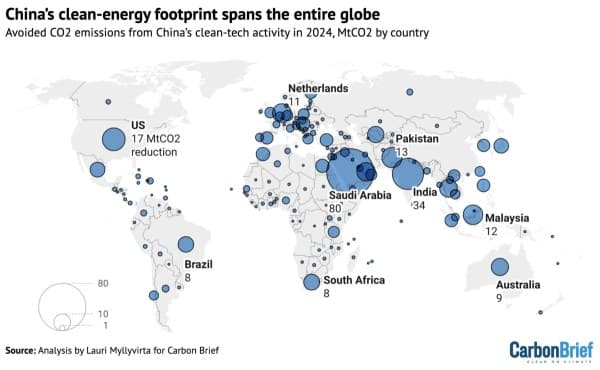China's CO2 Emissions Show First Decline Amidst Renewable Energy Surge, Challenging Global Climate Narratives

Recent analysis indicates that China's carbon dioxide (CO2) emissions have begun to fall, marking a significant shift driven by the rapid expansion of clean energy. This development challenges the perception that global emission reduction efforts are futile if major economies like China continue to increase their output. The decline, observed in the first quarter of 2025, is primarily attributed to robust growth in wind, solar, and nuclear power generation, which has outpaced electricity demand.
The tweet by "Econo ad absurdam" stated, "> climate change is real, reducing our emissions while China increases theirs is pointless." However, data suggests China's CO2 emissions were down 1.6% year-on-year in Q1 2025 and 1% over the preceding 12 months, according to analysis from Carbon Brief. This marks the first instance where clean power growth has directly led to a reduction in the nation's CO2 emissions, even as overall power demand increased.
China, the world's largest annual emitter of greenhouse gases, has committed to peaking CO2 emissions before 2030 and achieving carbon neutrality before 2060. The country has already surpassed its 2030 targets for installed wind and solar capacity, reaching 1,400 GW by 2024, well ahead of the 1,200 GW goal. Renewables now account for nearly 40% of China’s total power generation, showcasing a substantial investment in decarbonization.
Despite these advancements, China's climate policies are still rated as "Highly insufficient" by the Climate Action Tracker (CAT), primarily due to its continued reliance on fossil fuels and ongoing approvals for new coal projects. Experts recommend that China include absolute emissions reduction targets in its upcoming 15th Five-Year Plan and further strengthen its national carbon trading market. The nation remains a global leader in clean energy manufacturing, producing over 80% of solar panels and 75% of electric vehicles and their batteries worldwide.
The potential for a sustained decline in China's emissions hinges on continued clean energy deployment and strategic economic policies. While the country faces the complex task of balancing economic growth with environmental goals, the recent trends suggest a pivotal moment in its climate trajectory. This shift could significantly influence global climate action and the narrative around shared international responsibility.